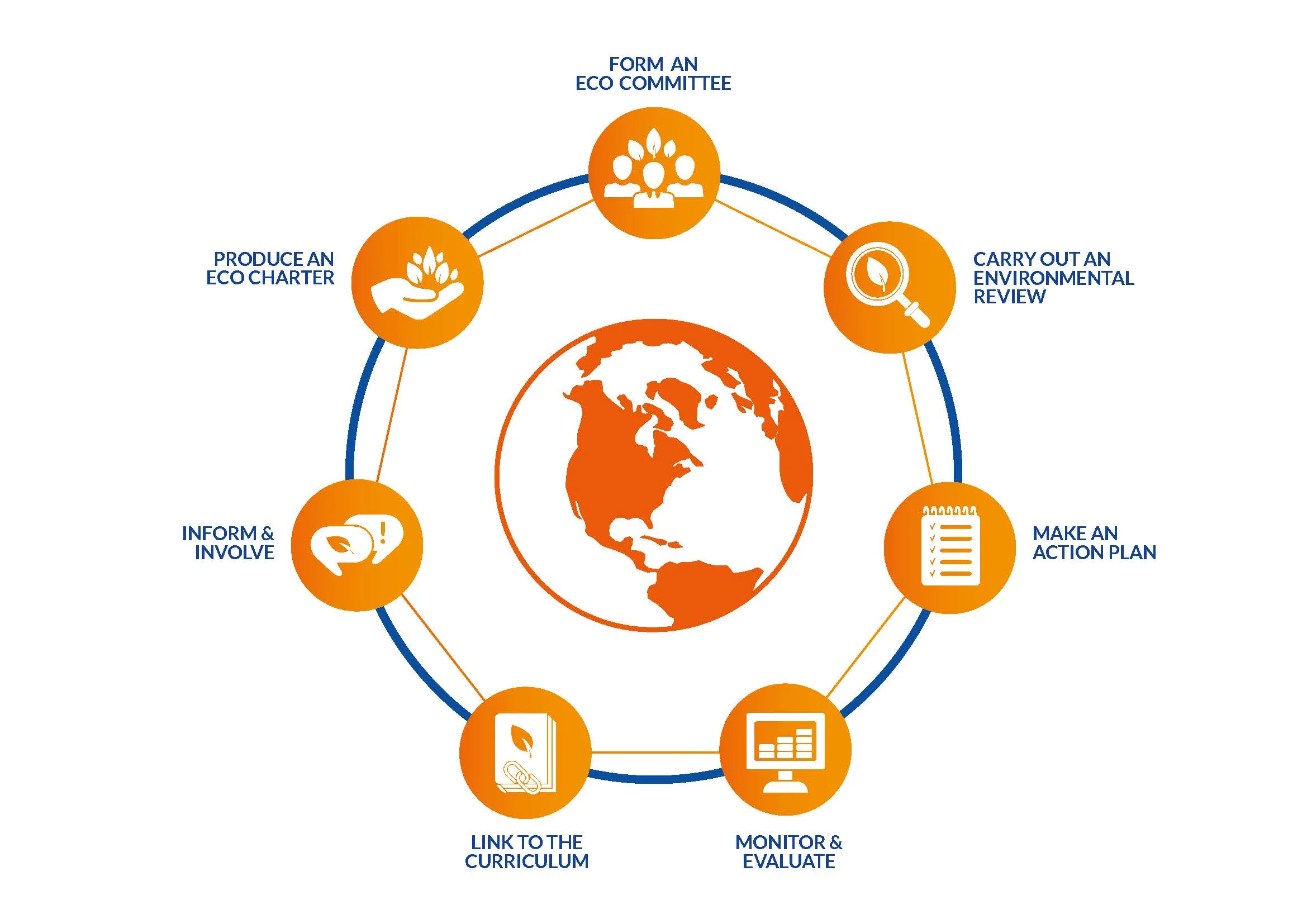The National Level
The FEE EcoCampus an international environmental education program with campuses participating from all over the globe. There are therefore national organisations that manage the program in each participating nation. Each national organisation appoints a National Operator who is responsible for managing the programme. The FEE EcoCampus national operator provides assistance, information, and eventually reviews the Campus’s progress and grants the Green Flag certification.
On Campus: The Seven-Step Methodology
Each campus must appoint one or more individuals who will champion the program on campus and implement the Seven-Step Methodology.
The Seven-Step Methodology is a blueprint that sets an agenda to be followed step by step to gain our internationally renowned Green Flag award. The methodology and programme are intended to be flexible enough to accommodate any campus and each step should be implemented to suit the campus capacity at the point of implementation.
FEE EcoCampus 7 Step Methodology
1: The Eco Committee
The first step of the FEE EcoCampus programme involves establishing a viable EcoCampus Committee within the organisational structure of the institution. This may be linked to the constitution of the Students Union and/or Environmental Society or become an official statutory committee within the college. The chairperson and vice-chairperson should have access to top level management.
The FEE EcoCampus Committee should be as representative of the whole organisation as possible. It should primarily be made up of students (making up the majority of the committee members whenever possible) and should also incorporate a combination of academic and research staff, a member of the executive board or governing authority and non-teaching staff; particularly facilities management, canteen/restaurant management, purchasing, and any other interested members of the campus and local communities.
The Committee aims to direct and address all phases of the FEE EcoCampus programme. It is the driving force of the programme and should ensure that the other steps are carried out.
The purpose of the FEE EcoCampus Committee is:
• To ensure the views of all members of the college community are heard and acted upon.
• To ensure the six other steps of the programme are successfully adopted and implemented.
• To give students responsibility and to ensure that their ideas are valued.
• To ensure the continuity of the programme in the long term.
• To link the campus community to the locality and external stakeholders.
2: Carry out an Environmental Review
The aim of the Environmental Review is to identify the initial situation of sustainability on campus. The results of the Environmental Review are used to derive the Action Plan. Environment should be seen in a broader sense to include everything around social and economic aspects. The review helps to establish whether a change is necessary, urgent or not required. It also assists in setting realistic targets and monitoring implementation.
The review should also involve how research of the institution or faculty can benefit the wider community and include reference to how the university can, or already is, working towards the United Nations Sustainable Development Goals. The Environmental Review can also become a participatory learning process enabling the EcoCampus Committee to get more people involved at an early stage without requiring specialist knowledge.
3: Action Plan
Information gained from the Environmental Review is used to identify priority areas and create an Action Plan. The Action Plan will not only contain action pertaining to campus and its faculties but also to how it can better engage in community outreach.
Action planning involves:
· setting achievable, and realistic targets with metrics that can be measured
· setting deadlines
· improving environmental performance on specific issues
· listing a number of agreed activities
· listing deadlines
· listing clearly allocated responsibilities for each action.
Action Plans should:
· link to learning on campus
· show any cost implications
· specify arrangements for Monitoring and Evaluation.
The Action Plan should be monitored regularly and continually amended to reflect the findings of subsequent Monitoring and Evaluation.
4: Monitor and Evaluate
Monitoring and Evaluation are used to assess progress made towards achieving targets identified in the Action Plan and to identify areas that require further corrective action. Monitoring and Evaluation also enhances whole college awareness by highlighting the successes of the actions undertaken. Monitoring and Evaluation should be developed in tandem with the Action Plan.
Monitoring is vital for identifying areas in your Action Plan that can be improved upon and amended. This aids performance and feeds back to further actions and new goals. Make sure the whole campus is aware of your progress by displaying any results and figures.
5: Linking to Learning on Campus
Sustainability topics studied as part of certificate, degree and master’s programmes should influence the way the whole college operates. Opportunities exist within FEE EcoCampus to make learning links into a range of subjects at many levels. As part of the environmental review, curricular mapping should take place to see how and where Education for Sustainable Development already is, or can be better linked to ongoing courses. The FEE EcoCampus programme can also be a catalyst to engage in research and sustainability issues amongst the communities around the campus.
There are numerous benefits for the campus in engaging in this type of learning. It develops investigative, problem led learning with real results and outcomes. This, in turn provides valuable graduate attributes and real life experiences for students. The FEE EcoCampus programme should be integrated through as many subjects and courses as possible and be used to inform the campus community of environmental issues and to inform actions. Ultimately graduates from an educational establishment that is involved in the FEE EcoCampus programme should be aware of the steps that can be taken to ensure that they are environmentally responsible throughout their future career.
6: Inform and Involve
The aim of the Informing and Involving step is to spread the EcoCampus Committee’s message throughout the campus and the wider community through ongoing information and publicity. A campus wide ‘Green Week’, intermittent ‘Days of Action’, or other student and staff led campaigns could be used to further this agenda. A green media outlet or social media platform synthesising the ‘Sustainability’ events on campus could also be way to inform and involve.
Involvement of the wider community can also bring benefits in both directions. Neighbours, local businesses, schools and the local authority can all be drawn in to provide advice and practical help. It is important to ensure that actions and events organised for the FEE EcoCampus programme are well publicised. This helps ensure maximum participation from the different groups involved.
7: Green Charter
The Green Charter is essentially a ‘This is How We Do Things Here…’ guide to environmental management on site. It may contain an environmental policy but essentially it should be a concise guidance document on how environmental issues are handled on campus.
The Green Flag
The International Green Flag award will be given to campuses that complete all the essential elements of the FEE EcoCampus programme. The Green Flag is a global symbol of positive environmental and social action.



